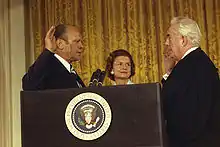Vice President of the United States
The vice president of the United States (VP or VPOTUS)[1][2] is the second highest executive officer of the U.S. federal government after the president of the United States. The vice president ranks first in the presidential line of succession and is also the officer of the legislative branch, president of the Senate and the presiding officer of the Senate.[3][4]
| Vice President of the United States of America | |
|---|---|
 Seal of the Vice President of the United States | |
 Flag of the Vice President of the United States | |
| United States Senate Executive branch of the U.S. government Office of the Vice President | |
| Style |
|
| Abbreviation | VPOTUS, VP, Veep |
| Member of | Cabinet National Security Council National Economic Council |
| Residence | Number One Observatory Circle |
| Seat | Washington, D.C. |
| Appointer | President of the United States Electoral College |
| Term length | Four years, No term limit |
| Constituting instrument | Constitution of the United States |
| Inaugural holder | John Adams |
| Formation | March 4, 1789 |
| Succession | First (presidential line of succession) |
| Salary | $235,000 (annually) |
| Website | whitehouse.gov |
Kamala Harris is the 49th and current vice president of the United States, in office since January 2021.[5]
Constitutional roles and duties
President and presiding officer of the United States Senate
Article I, Section 3, Clause 4, gives the vice president the title President of the Senate, authorizing the vice president to preside over the Senate. The vice president is responsible for maintaining order, allowing members to speak, and explain the Senate's rules and practices. This position also has the authority to cast a tie-breaking vote.
Presiding over impeachment trials
As the president of the Senate, the vice president may preside over impeachment trials, although the Constitution does not specifically require it. When the president is on trial, the constitution requires that the chief justice of the United States must preside.[6] No vice president has ever been impeached.
Presiding over electoral vote counts
The Twelfth Amendment allows the vice president, as the president of the Senate, receive the Electoral College votes and opens the sealed votes.[7] The votes are counted during a joint session of Congress every four years on January the 6th.[8]
Presidential advisor
In recent years, vice presidents have been viewed as important presidential advisors. Al Gore was an important adviser to President Bill Clinton on issues of foreign policy and the environment.
Congressional liaison
The vice president is seen an important liaison between the presidential administration and Congress.
For example, Dick Cheney held weekly meetings in the Vice President's Room at the United States Capitol, Joe Biden played a key role in bipartisan budget negotiations, and Mike Pence often met with House and Senate Republicans. Kamala Harris, played a key role in passing legislation during the 117th congress.
National Security Council member
Since 1949, the vice president has legally been a member of the National Security Council. Modern vice presidents have also been apart of the president's daily intelligence briefings and participate in meetings in the Situation Room with the president.
Eligibility and requirements
Article II, Section 1, Clause 5 of the constitution states for a person to serve as vice president must:
- be a natural-born citizen of the United States.
- be at least thirty-five years old.
- be a permanent resident in the United States for at least fourteen years.[9]
Election process
The vice president is elected by the people through the Electoral College to a four-year term, along with the presidential candidate or the incumbent president as their running mate.[10] The presidential candidate or incumbent president must have at least 270 electoral college votes in order to win the election.[11]
Vice President-elect of the United States

The vice president-elect of the United States is the candidate who has won the United States presidential election along with the presidential candidate and is awaiting inauguration to become the vice president.
Inauguration

The president elect, vice president-elect, or incumbent president and vice president immediately began their four-year team on inauguration day every four years on January 20. The original inauguration date was held on March 4, but was later changed in 1933.
Presidential line of succession

The vice president ranks first in the presidential line of succession, if the president dies, resigns, or is impeached. Only eight vice presidents have succeeded the president in resignation or death such as John Tyler, Millard Fillmore, Andrew Johnson, Chester A. Arthur, Theodore Roosevelt, Calvin Coolidge, Harry S. Truman, Lyndon B. Johnson and Gerald Ford.
The speaker of the House ranks second in the presidential line of succession if the vice president dies, resigns or is impeached from office.
John C. Calhoun and Spiro Agnew are the only U.S. vice presidents to have resigned from office.
Office of the Vice President of the United States
The Office of the Vice President includes personnel staff who directly support or advise the vice president of the United States. It is primarily office is in the Eisenhower Executive Office Building with offices for the vice president also in the West Wing of the White House, the United States Capitol, and in the vice president's official residence.
Travel and Transportation

Although any U.S. Air Force aircraft the vice president is aboard is referred to as Air Force Two during the flight. In-country trips are typically handled with just one of the two planes, while overseas trips are handled with both.
Residence

Number One Observatory Circle is the official residence of the vice president and the second family of the United States. It has been the official residence of every U.S. vice president since Nelson Rockefeller in 1974.
Protection
.jpg.webp)
The United States Secret Service is in charge of protecting the vice president and the second family at all times. As part of their protection, the vice president, second spouse and immediate family members are given Secret Service codenames. The use of codenames are used due to security and safety reasons.
List of living former vice presidents of the United States
As of 2024, there are five living former vice presidents.
The most recent former vice president to die was Walter Mondale (1977–1981) on April 19, 2021 at the age of 93.
_(cropped).jpg.webp) Dan Quayle
Dan Quayle
served from 1989 to 1993_(cropped).jpg.webp) Al Gore
Al Gore
served from 1993 to 2001.jpg.webp) Dick Cheney
Dick Cheney
served from 2001 to 2009_(cropped).jpg.webp) Joe Biden
Joe Biden
served from 2009 to 2017_(cropped).jpg.webp) Mike Pence
Mike Pence
served from 2017 to 2021
References
- "U.S. Senate: About the Vice President (President of the Senate)". www.senate.gov. Retrieved 2023-11-21.
- "The Vice-Presidency". WHHA (en-US). Retrieved 2023-11-21.
- "Order of presidential succession | USAGov". www.usa.gov. Retrieved 2023-11-21.
- "The Executive Branch". The White House. Retrieved 2023-11-21.
- "Kamala Harris: The Vice President". The White House. Retrieved 2023-02-21.
- Gerhardt, Michael J. "Essays on Article I: Trial of Impeachment". Heritage Guide to the Constitution. The Heritage Foundation. Archived from the original on August 22, 2020. Retrieved October 1, 2019.
- 24 Stat. 373 Archived October 15, 2020, at the Wayback Machine (Feb. 3, 1887).
- "Constitutional requirements for presidential candidates | USAGov". www.usa.gov. Retrieved 2023-11-21.
- "Electoral College | USAGov". www.usa.gov. Retrieved 2023-11-21.
- "What is the Electoral College?". National Archives. 2019-08-27. Retrieved 2023-11-21.
.jpg.webp)